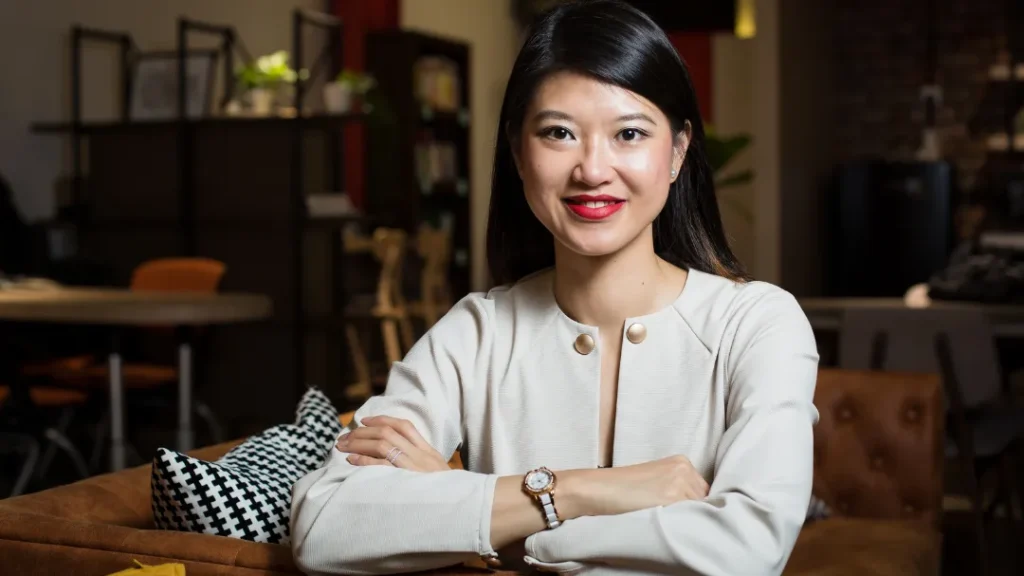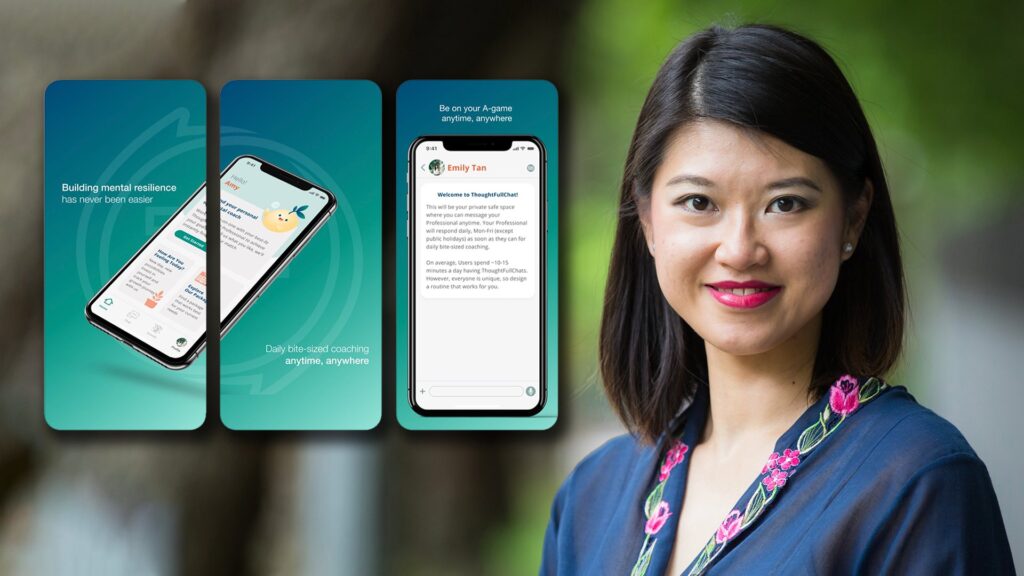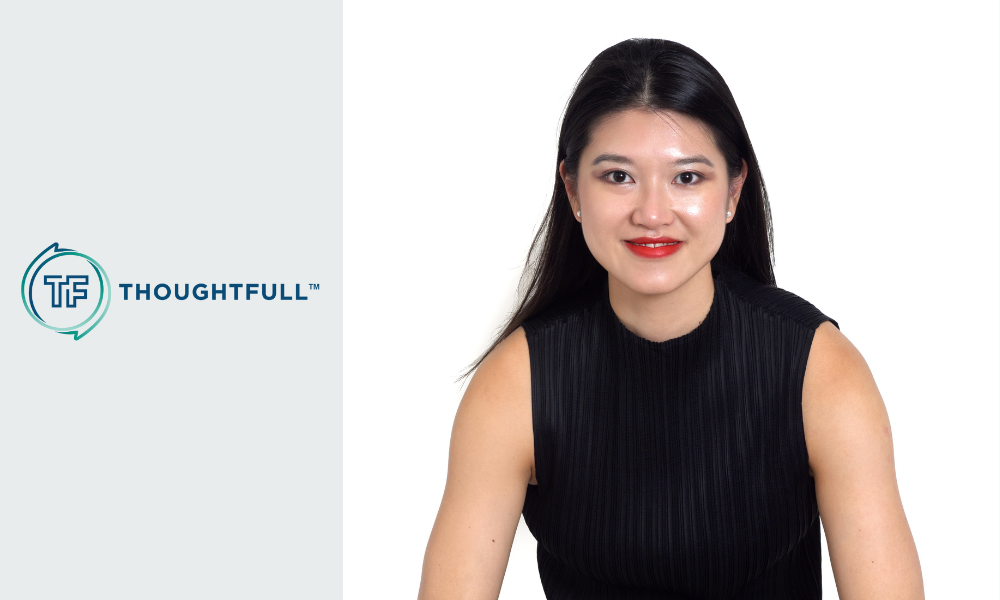Raised in Malaysia, Low’s life took a profound turn as she dedicated two decades to caring for a family member grappling with mental health challenges. She did this while simultaneously climbing the ranks in banking, where she gained invaluable experience – but ultimately felt compelled to pursue something “more meaningful.”
Enter ThoughtFull, the brainchild of Low’s vision to revolutionise mental wellbeing. As CEO and Founder, she’s steering this cutting-edge tech platform towards empowering users to take charge of their mental health journey.
ThoughtFull isn’t just another app; it offers users personalised 1:1 coaching sessions with certified mental health professionals, along with a range of interactive tools and learning features for users to proactively engage with.
But Low’s vision extends beyond individual empowerment. ThoughtFull also serves as a bridge, connecting employees with much-needed mental health support through benefit programs, while forging partnerships with insurers and medical professionals to ensure comprehensive care and mental health coverage at scale.
In a world where mental health is more critical than ever, Joan Low and ThoughtFull are helping to transform lives. Insurtech Insights sat down with her to find out more.
What prompted you to launch ThoughtFull in the first place?
My journey into launching a healthcare company focused on mental health feels like a calling that has been brewing for 20 years. My family and I have been caregivers to a loved one who has grappled with mental health challenges for more than two decades, and so this isn’t new to us. We’ve intimately experienced the ups and downs associated with mental health over this extended period.
Back in the late nineties and early two thousands, mental health discussions were scarce. It wasn’t a topic trending on social media or covered in TikTok videos offering advice on managing stress and anxiety. Mental health seemed like a black box, largely centred around pharmacological interventions and often only addressed when it reached psychiatric need. Access to treatments in Asia was limited or prohibitively expensive, leaving many without options.
Over the past two decades, there have been encouraging developments in mental health care. Digital innovations, like telepsychiatry, have emerged, particularly in the United States, offering new avenues for support. Additionally, there has been a significant shift in the de-stigmatisation of mental health, largely propelled by social media, making it a more open and democratised conversation.

The onset of the pandemic further highlighted the importance of mental health care. Before diving into mental health, I spent six years in finance, managing a substantial portfolio in Hong Kong. However, the stars aligned, and I made the decision to transition full-time into mental health advocacy in 2018, well before the pandemic hit. This move wasn’t driven by the pandemic-induced surge in awareness; it was a response to the persistent lack of comprehensive mental health solutions in Asia.
The frustration of seeing global mental health innovations failing to translate effectively into the Asian context, due to the unique nature of healthcare systems and the importance of localisation, fuelled my decision to pivot into mental health. Unlike the tech industry where copy-pasting models might work, healthcare demands a nuanced approach tailored to regional needs. That’s why I took the leap into mental health, striving to bridge the gap between global innovations and local requirements.
How does ThoughtFull differentiate itself from other mental health platforms in the marketplace?
Thoughtful is a digital mental health company backed by Temasek, providing seamless end-to-end mental health care for all, primarily through employee benefits and insurers. When we address mental health, we take a comprehensive approach, focusing not only on crisis intervention but also on preventive measures and overall well-being.
At the heart of our offerings is ThoughtFullChat, a mobile application serving as a one-stop platform for users to access a wide range of resources, from preventive tools to crisis hotlines. On the preventive side, users can explore self-serve lessons on various topics related to well-being, available in up to 11 languages on the app. If users wish to delve deeper and connect with a mental health professional, our priority algorithms match them with suitable counsellors or psychologists from across the region and globe.
You’re diving headfirst into an entire industry that is new to you. I’m not clinically trained. It is also a very fragmented market. And so it’s not like you have one repository of information. It was scattered everywhere. It was daunting.
Joan Low, CEO and Founder of ThoughtFull
One of the challenges in mental health care is the lack of clarity for individuals on the different roles and suitability of counsellors, psychologists, and psychiatrists. Our platform addresses this by helping users find their best-fit mental health coach, considering factors like expertise and chemistry. Moreover, our asynchronous text-based coaching allows for flexible and unlimited support, complemented by options for video therapy, in-person sessions, and crisis hotlines, providing a holistic approach to mental health care.
For employers, mental health support presents unique challenges. Unlike physical fitness initiatives, mental health solutions require a personalised approach tailored to individual needs. ThoughtFull assists employers in providing localised and personalised mental health support for their employees. Additionally, our Thoughtful Insights app offers employers valuable data and insights into the overall effectiveness of their mental health programs, helping them measure ROI and identify areas for improvement.
Building such a comprehensive ecosystem has not been without its challenges. As pioneers in the field, we’ve had to navigate uncharted territory, from consolidating fragmented pieces of the mental health landscape to innovating commercial structures, such as partnering with insurers to make mental health services more affordable. Despite the challenges, we view this journey as an exciting opportunity to innovate and make a meaningful impact in the mental health market.
In essence, our mission at Thoughtful is to simplify the mental health journey for all stakeholders by providing support, resources, and insights every step of the way.
What challenges still exist in the space, and what can be done to address these difficulties?
I believe there’s been a significant shift, particularly over the past two decades, in attitudes towards mental health. The awareness has grown substantially, although its prevalence varies across the diverse regions of Asia. From North Asia to Southeast Asia, South Asia to Central Asia, each area presents unique cultural perspectives and challenges.
While stigma surrounding mental health still exists, there’s undeniable evidence of progress. Governments are increasingly recognising the importance of mental health, as evidenced by the inclusion of mental health initiatives in budget allocations, particularly in the post-pandemic era. Additionally, there’s a groundswell of demand for mental health support from younger generations, including millennials and Gen Y individuals, especially in urban areas where discussing mental health is becoming less taboo.

However, there’s still work to be done in institutionalising mental health support, particularly in terms of integrating it as a permanent fixture in employee benefits packages. The landscape is still evolving, with many organisations navigating the nuances between traditional employee assistance programs and newer digital mental health providers like ours. As such, there’s a need for continued education and exploration to ensure that mental health support becomes an integral part of workplace wellness initiatives.
You launched your own company, diversifying away from a very successful banking career. Was there a tipping point that made you just say, right, enough’s enough, now it’s time for me to do this?
What really spurred the decision to make the transition was a desire for more meaningful impact. In finance, there’s often a clear trajectory of where your life will be in 20 years, and it wasn’t the path I envisioned for myself. I sought something that could not only personally resonate but also have a significant regional or global impact.
Mental health, as I mentioned, is a realm I’m intimately familiar with due to my two-decade role as a caregiver. The catalyst for the change was recognising the substantial gap in Asia regarding the delivery of holistic, end-to-end mental health care, both for individuals and within corporate settings for employees. Accessibility and affordability were glaring issues in this context.
So, I decided, why not take the leap? Let’s see what we can accomplish. And that’s how the journey commenced in 2018. The evolution of this journey is a story in itself, but I’ll pause here for now. If you’re interested, I can certainly delve into how it unfolded further.
How challenging was it to found ThoughtFull?
Very challenging. You’re diving headfirst into an entire industry that is new to you. I’m not clinically trained. It is also a very fragmented market. And so it’s not like you have one repository of information. It was scattered everywhere, and so it was daunting.
But I think a couple of things that became clear to me very quickly, that being new within the mental health ecosystem was actually a strength because it meant that I came in without baggage. I came in without having any preconceived ideas of why things are the way they are and literally could come in with a clean slate, focus on the patient or the client journey: what they need, what the problem sets are, to what extent do other people experience it as well, in what shapes and forms and how is it different.
For about 12 to 18 months, I dedicated myself to groundwork. Before launching any digital products like ThoughtFullChat or ThoughtFull Insights, I immersed myself in the field. I conducted workshops, assessments, and engaged with thousands of individuals, collecting valuable data points and gaining insight into the intricacies of the client journey. This deep dive enabled me to identify gaps and fragmentation within the ecosystem, laying the groundwork for a seamless user experience.
I think it was daunting because there were just so many unknowns, but the deeper you dive into it, the more stones are turned up and you get a mapping of the dots that are in the ecosystem. And when you don’t have any preconceived ideas, you can essentially connect the dots in very different ways than how other incumbents would have done it.
In terms of investment and getting the product out there, did you find doors opened easily?
So, initially, I made a deliberate choice to bootstrap the groundwork phase of the project. Coming from a Wall Street background, I could have easily opted to create an impressive pitch deck, raise funds, and then embark on market exploration. However, I wanted to approach the process with a clean slate, allowing for genuine market discovery. It wasn’t until 2020, when I had a clear proof of concept for ThoughtFullChat and a solid understanding of our direction, that I sought our first round of funding from friends and family.
Navigating the fundraising process, especially in a nascent market like mental health tech, presented its own set of challenges. Pre-pandemic, mental health was relatively new to investors, requiring some education about its potential and significance. Nonetheless, I was efficient with capital, knowing precisely what resources we needed to execute our plans, which streamlined the process.
…the deeper you dive into it, the more stones are turned up and you get a mapping of the dots that are in the ecosystem. And when you don’t have any preconceived ideas, you can essentially connect the dots in very different ways than how incumbents would have done it.
Joan Low
Post-pandemic, the investment landscape has shifted. Our most recent funding round, led by Temasek entity, Sheares Healthcare, was a significant milestone. Temasek, a prominent Sovereign Wealth Fund in Singapore, is a major healthcare investor across Asia and globally. Their involvement not only validates the market potential for mental health but also recognises the progress and traction we’ve achieved.
This signals a notable evolution in investor attitudes towards mental health, with a greater appreciation of its importance and potential. While education about mental health remains ongoing, investors are increasingly recognising the need and are exploring various approaches and business models in this space.
How have companies responded to the services of ThoughtFull? Has it seen a steep uptake?
Certainly, in terms of market sentiment and traction, the landscape in Asia varies across companies at different stages of mental health integration. Some are starting from scratch, with no prior mental health infrastructure, while others, particularly multinational corporations, may already have traditional employee assistance programs in place from regions like the UK, Australia, or the US.
For the former, it’s about leapfrogging the market by implementing innovative and digitally driven solutions, such as ThoughtFull’s holistic platform. For the latter, the focus is on enhancing existing programs or exploring complementary options.
Overall, the reception has been strong, with the macro environment serving as a significant tailwind, particularly during the pandemic. The acceleration of mental health resource adoption during this time has underscored its importance for employee well-being. Looking ahead, there’s a consensus that this momentum will continue post-pandemic for several reasons.

Firstly, companies have had the opportunity to experiment and assess the effectiveness of mental health initiatives over the past few years. Reports, like the recent one from Deloitte in the UK, highlighting the significant return on investment in mental health, further reinforce the value of such initiatives in improving productivity, retention, and talent attraction.
Moreover, there’s a growing recognition that prioritising employee well-being is essential for remaining competitive in the talent market. The newer generations of employees, including Gen Y and Millennials, are increasingly discerning, seeking employers who prioritise their holistic well-being, not just financial compensation. As a result, investing in mental health resources has become a non-negotiable for companies looking to attract and retain top talent and foster a supportive workplace culture.
In summary, both top-down and bottom-up pressures are driving continued traction and investment in mental health initiatives across the region.
What’s new for ThoughtFull over the next few months? Are there any new projects and product launches that you can tell us about?
Certainly, there are some exciting projects in the works that have been keeping us occupied lately. Looking ahead, our clients—organisational payors, insurers, and employers—can expect significant advancements in our ThoughtFull Insights dashboard. We’re refining this tool to offer even more transparency and structure, enabling our partners to measure and track progress in mental well-being more effectively. Such visibility is crucial for ensuring the longevity and impact of our efforts.
Additionally, we’ve been fortunate to establish partnerships with major insurers in Asia, including AIA and FWD. Continuing these collaborations remains a priority as we strive to make mental health services more affordable and accessible throughout the region. We’re dedicated to expanding our reach across different parts of Asia, and there will be forthcoming announcements regarding these initiatives.
What inspires you in Healthtech today?
I see two key aspects to consider: our mission and the remarkable advancements in technology that are accelerating our progress toward achieving that mission. Speaking from my perspective and reflecting on the broader health tech industry, I believe many of us are deeply driven by our mission. At ThoughtFull, our mission is clear: we are simplifying mental health for your growth, with pioneering science-backed approaches that work especially for you, no matter who or where you are.
This mission serves as a powerful anchor, especially during the inevitable ups and downs of the entrepreneurial journey. Without a genuine and impactful mission, the challenges of entrepreneurship can become overwhelming. So, having a mission that resonates deeply with our values and goals is truly inspiring.
On the other hand, the technological developments in the health tech space are incredibly exciting. While I’m cautious not to overstate the capabilities of artificial intelligence (AI) as a cure-all solution for life or healthcare, it undoubtedly represents a significant advancement.
AI serves as a potent tool that can augment and enhance our efforts in healthcare. It’s not a panacea, but it offers valuable opportunities to improve healthcare delivery and outcomes. This intersection of mission-driven work and cutting-edge technology is where the most exciting progress is happening, and it’s a privilege to be part of this journey.
Interview by Joanna England









